Category / Research Centres
Congratulations to Dr Daisy Wiggins for her successful bid for NIHR Undergraduate Internship funding
Dr Daisy Wiggins was successful in her bid for NIHR Undergraduate Internship funding. This is a small aspect of a much larger body of work being done in collaboration with University Hospitals Dorset (UHD) with Minesh Khushu consultant Neonatologist at UHD, Dr Steve Trenoweth and Michael Lyne here at BU. Daisy, supervised by Prof Vanora Hundley and Steve T. will herself be supervising a BU undergraduate student who has just successfully interviewed. The intern will be looking at the literature available on women and families involved in care proceeding particularly looking at current support, interventions and help offered during pregnancy or at the removal of their baby.
As of 2022, 86.9% of women attending court for care proceedings, had cases whereby the child/ren were less than 11 months old and a large majority were babies (Alrouh et al. 2022). The evidence is clear on how this has a significant impact on the newborn in the immediate postnatal period, but also in terms of future development. Furthermore the wider impact on the woman, families and care systems is well documented, what isn’t however is currently available support and services for these children, women and families. The intern will look at currently literature to contribute to a scoping review before supporting PPI with women who have experience of this to understand what provisions of care and interventions are needed.
It is hoped that the output from this internship will be a stepping stone into a larger PhD project that identifies pertinent factors (personal, social/ cultural, legal and health) to improve our understanding of the needs of women who are at risk of repeated care proceedings following birth.
With future aspirations of developing and testing a service level approach / pathway to meet the needs of pregnant women involved in care proceedings (and particularly those who are subject to repeat proceedings).
Check out BU_research and BU_midwifery for details of the focus groups to please share
Congratulations to Malika Felton for winning best oral presentation at the WiSEAN conference
BU Programme Lead for BSc (Hons) Sports Therapy, Dr Malika Felon was awarded the prize for Best Oral Presentation at the WiSEAN conference (Women in Sport and Exercise Science Academic Network) at University of Portsmouth in June 2024. This comes after her award of the Early Career Researcher Award at the same conference last year in Liverpool.
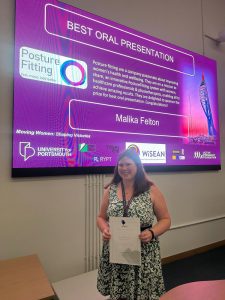
Malika presented on behalf of the Reproductive Health and Outdoor Swimming Group, which includes experts from across cold water physiology, exercise physiology, reproductive science, maternal health, obstetrics, neonatology, water epidemiology and representatives from the Open Water Swimming Society and an open-water swimming social enterprise (University of Plymouth, University of Portsmouth, UCL, NHS Trusts, Scottish Environment Protection Agency, Bluetits Chill Swimmers).
The presentation was on the group’s work ‘Cold Water Swimming and Pregnancy: A Scoping Review and Consensus Recommendations’. The work recognises the lack of evidence-based information to answer the many questions women have about cold water swimming during pregnancy. The presentation gained a lot of interest, and the group encourage future research to provide the evidence on which accurate advice can be based, allowing women to make evidence based decisions on whether to continue cold water swimming during pregnancy.
Bournemouth University had a group of eight members of staff travel up the coast to attend the WiSEAN conference, including supporting Megan Chesters, a final year undergraduate student from BSc (Hons) Sports Therapy, present her final year Research Project as a poster presentation.
Dr Malika Felton writes “The WiSEAN conference is a fantastic supportive environment, and I am honoured to be recognised for my work at two conferences in a row.”
“As part of the award I received a signed copy of The Female Body Bible (The Well HQ), which I am very much looking forward to read and has been on my to read list since before it came out. The foreword at the start of the book is ‘For those who want to forge a better future for girls and women everywhere – in sport, in health, in life’. I’m looking forward to being a part of this future, working alongside other amazing researchers in the area of women’s health.”
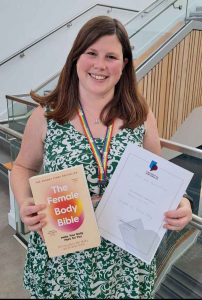
A successful second Women’s Health Research Symposium
The Centre for Midwifery and Women’s Health hosted their second Women’s Health Research Symposium on Tuesday 25th June 2024, sharing women’s health research from across Dorset.
The event was funded by the Centre for Midwifery and Women’s Health, The Women’s Academic Network, and The Doctoral College. The event provided an opportunity for academics, clinicians, researchers, and third-sector organisations to network, discuss ideas, and outline key priorities in women’s healthcare.
The themes of the presentation mirrored the priorities of the Women’s Health Strategy for England including tackling inequalities and wider determinants of health, improving access to services, health promotion through education, women’s mental health, and supporting women’s health throughout the life course. Keynote speakers included Dr Michael Dooley, Visiting Professor at BU (Bournemouth University) and Fellow of the Royal College of Obstetricians and Gynaecologists, Helen Crook, Strategy and Transformation Programme Manager leading on the Dorset Women’s Health Hub, and Marianne Storey, Chair of the Dorset Women CIC.
Part-funded by The Doctoral College Culture and Community grant, the event aimed to highlight the work of our postgraduate researchers. A range of posters and oral presentations were delivered by BU postgraduate students including Rosie Harper, Eunhee Kim, Umarah Mahmood, Sara Ahmadi, Pritika Gurung, Megan Chesters, Abier Hamidi, Kate Rattley, and Nurudeen Adesina.
Academics from the BU Centre for Midwifery and Women’s Health also discussed new research findings including new consensus recommendations on cold water swimming in pregnancy (Dr Malika Felton) and the lived experience of LGBTQ+ parents who breast/chest-fed their children (Dr Sarah Hillier). We also welcomed Associate Professor Alyx Taylor from AECC University College to discuss her work around the identification of perinatal mental health needs.
In addition to a range of engaging oral presentations, we invited Dr Humaira Khan (AECC University College) to display her foetal alcohol syndrome simulator, and Pauline Ferrick-Squibb (Arts University Bournemouth) to showcase her quilt that was created through participatory research with women sharing their experience of menopause. The event concluded with a panel discussion with BU’s Women’s Academic Network and research centres including the Centre for Midwifery & Women’s Health, Ageing & Dementia Research Centre, andCentre for Seldom Heard Voices.
The second Women’s Health Research Symposium was a success, and we look forward to inviting delegates back to the university next year. The event provided an opportunity for academics, clinicians, and stakeholders to make collaborative partnerships to improve women’s health across Dorset.
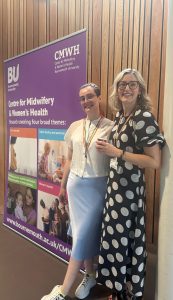
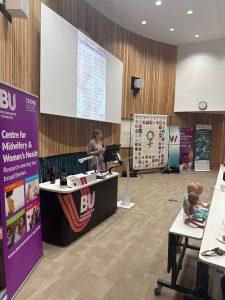
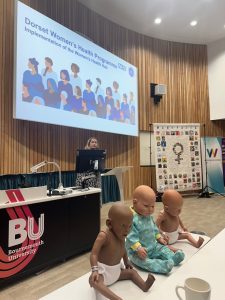
The ADRC Ageing Well Together event was a great success
The Ageing & Dementia Research Centre hosted a free public event in June with 52 attendees from local organisations, members of the public and researchers. The purpose of the event was to bring people together to showcase research and initiatives around the theme of ageing well.
Key speaker
The key speaker of the event was Rachel Woodward Carrick, speaker and author of Happy Silver People: How to make life happier as you grow older within the BGB lecture theatre.
Presentations/showcase
Both Mel Hughes and Angela Paget from PIER shared some of their learning from a collaboration with the BCP Age Friendly Communities network.
Here are some words from Mel summarising the collaboration – The BU PIER partnership have been supporting this work as forum and steering group members from the start and so it felt a natural opportunity to collaborate when we were asked to start a conversation with older people across Bournemouth, Christchurch and Poole, on envisioning an age friendly community. We used appreciative inquiry and the 4D model of discover, dream, design and deliver to provide a framework for a series of workshops conducted in March 2024 with Age Friendly partners, Beautiful Wisdom, Salvation Army, Prama Care and Christchurch Community Partnership. We posed the same question to the conference attendees – if there are no limits, what, for you does an age friendly community look and feel like. It was great to see how open and engaged the attendees were to envision an age friendly community and the steps they would take to making it a reality. We are excited to share the report from the March conversations in July.
There were tables set up in BG 115 and 116 where local care organisations showcased their services and BU research staff showcased their research allowing people to browse their stands and to ask questions, as well as getting hold of some much-favoured merchandise! There was also a visit from the very special Nelly the therapy dog from the company ‘Hey Doggie’ with her owner Jacqui, who we have built a good relationship with having first met them at the Dog Café event at the Potteries Care Home (this takes place the second Wednesday of each month).
There was also the chance to hear from the ADRC Research Participant Group, who shared their experiences of contributing to research. This group meets monthly via Zoom with two in-person meetings taking place each year. We are always looking for new members of the public to join this group. Further details can be found on www.bournemouth.ac.uk/adrc (if you know of anyone who would be interested in joining or if you are a BU researcher who would like to present your research at one of these monthly meetings, in order to get public engagement with your project).
Yoga activity
After a very successful morning at the event, we were joined by a Sport BU yoga teacher, Melsia Tomlin-Kraftner, who gave us all an introduction to Chair Yoga in the lecture theatre, this was a very engaging and informative session on the benefits of regular movement as we age, as well as providing a lot of laughs from those participating.
Event highlights
Associate Professor Susan Dewhurst and Associate Professor Michele Board the co-lead of the centre and Dr Michelle Heward the deputy co-lead of the centre have provided their best bits of the event below:
- My highlight was the atmosphere and energy that was present in the showcase event. Given the diversity of tables, there was something for everyone, making it a really inclusive event (Dr Susan Dewhurst).
- It was very much an example of a collaborative, community event with sharing of expertise about ageing (the lived experience!) and research we are doing to promote healthy ageing and raising our understanding of people living with dementia (Dr Michele Board).
- Hearing from members of the public about their involvement in ADRC research and what it meant to them was a powerful reminder of the impact that our research can have on our local community. Attendees gave positive feedback about the event, one attendee said, ‘Interesting talks in the lecture theatre, fascinating info and chat in the ‘break out room’ and especially great to meet the research students – such a credit to BU! I found it all energising and stimulating and am better informed all round after attending’ (Dr Michelle Heward).
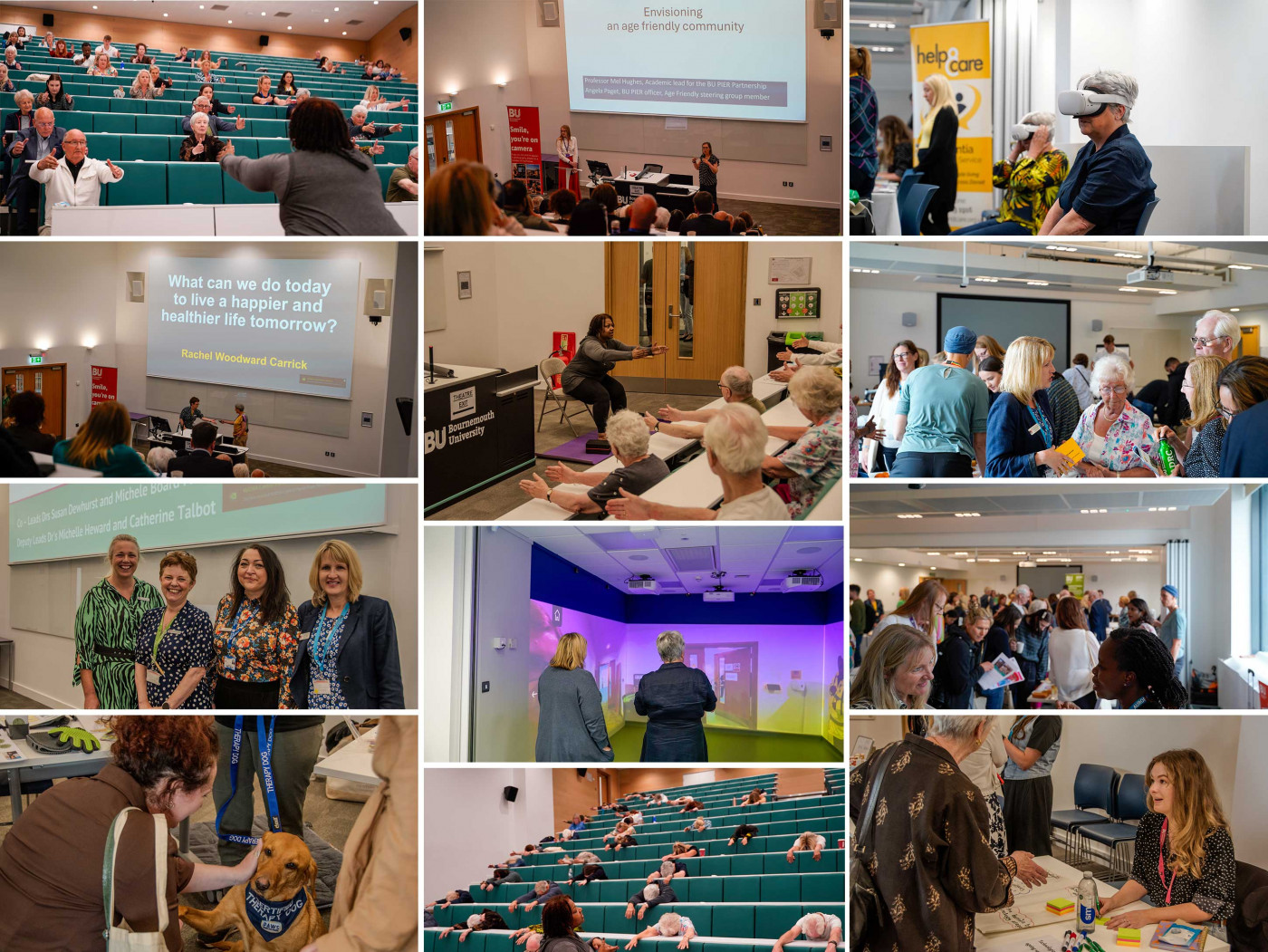
The work of the ADRC focuses around maintaining good quality of life as we age and supporting those living with long-term conditions in older age, such as dementia. Please follow us on social media @BournemouthADRC to keep up to date with our latest news and visit our website www.bournemouth.ac.uk/adrc to check out more about our research and our education and training resources.
RKEDF July Digest – Training opportunities for YOU!

Have you heard the news!!!!!!
We are excited to share some great RKEDF training opportunities coming up in July 2024!
Click on the titles to find further details and book your place!!!!
AHRC & ESRC: How to write an application in the new format for the Funding Service
Thursday, July 4, 11:00 – 13:00 – Online
The session will cover the requirements for the new UKRI application format. We will discuss the application structure focusing on AHRC and ESRC and the sections and how to complete them. The session will be framed with more general information on the various Research Councils that comprise UKRI and best practice in writing applications for external research funding.
Principal Investigation – Post Award for RKE
Wednesday, July 10, 14:00 – 15:00 – Online
This session is aimed at any researcher who is, who plans to be, a Principal Investigator for an externally funded research or knowledge exchange project.
New Generation Thinkers 2025 – AHRC/BBC Radio 4
Thursday, July 11, 11:00 – 13:30 – F112 – Fusion Building – Talbot Campus
This is our annual new generation thinkers’ workshop, where we look at the call, requirements, eligibility and having a panel chair and member’s point of view. For early career researchers and PGRs who want to share their research with the public.
Call information: Develop your media skills with the New Generation Thinkers scheme. The scheme is a partnership between the Arts and Humanities Research Council (AHRC) and the BBC.
Building a Policy Influencing Strategy
Friday, July 12, 9:30 – 16:30 and Thursday, July 18, 9:00 – 16:00 – Zoom
A one-day online workshop for up to eight researchers, delivered via Zoom and facilitated by public affairs and policy consultant Carys Davis, from The Other Place.
The session will enable participants to:
- develop key messages, supporting narratives and evidence, identify and map their audience, gain insight into the channels available for influencing.
RKEDF: ECRN: Where do you begin with Research funding?
Friday 12th July – 10:00-12:00 – Online
The workshop is aimed at researchers from across BU at either postdoctoral or early career stage. It will focus on funders including (but not limited to) the AHRC, UKRI, British Academy, Welcome Trust, and NIHR.
Are you an Early Career Researcher interested in applying for research funding but unsure where to start? In this BU ERC Network special session, professional bid writing consultant Sally Baggott (PhD) offers her insights in the contemporary funding landscape for ECRs,
———————————————————————————————
Please assist us in avoiding any waste of resources; make sure you can attend or cancel your booking prior to the session.
For more training opportunities, please visit the ‘SharePoint site’ here.
For any further information, please contact: RKEDF@bournemouth.ac.uk
RKEDF: New Generation Thinkers 2025 – AHRC/BBC Radio 4

RKEDF: New Generation Thinkers 2025 – AHRC/BBC Radio 4 – Thursday 11th July – 11:00-12:30 – F112 – Fusion Building – Talbot Campus
Facilitated by: Professor Richard Berger
This is our annual new generation thinkers’ workshop, where we look at the call, requirements, eligibility and having a panel chair and member’s point of view. For early career researchers and PGRs who want to share their research with the public.
Call information: Develop your media skills with the New Generation Thinkers scheme
New Generation Thinkers is a career development scheme for early career researchers to:
- develop their communication and media skills
- get their research in front of the general public
The scheme is a partnership between the Arts and Humanities Research Council (AHRC) and the BBC.
If your application is successful, you’ll learn how to communicate research findings to the widest possible audience.
The scheme gives participants the opportunity to:
- create programme ideas with experienced BBC producers at workshops
- work with the team at BBC Radio 4 to get your ideas on air
- get media training
- take part in a workshop around engaging policymakers
- get involved with the AHRC-funded Being Human Festival
New Generation Thinkers has run since 2010. Each year a number of applicants are invited to create ideas with the BBC, of which we select the next cohort of New Generation Thinkers.
You can: read about the scheme’s achievements over the first 10 years – find the currently open New Generation Thinkers funding opportunity on the UKRI funding finder once it’s launched.
Previous winners: see a list of previous winners – listen to content created by previous winners on BBC Sounds (search for New Generation Thinkers) – read New Generation Thinkers magazine
Book your place here – under “New Generation Thinkers 2025″ in the drop-down menu
For any queries regarding this workshop, please contact RKE Development Framework
Free Research Event – Wednesday 26th June – A Celebration of Sustainable Food Related Research

BU Research Centre CSSRC is celebrating its interdisciplinary and intersectoral research around sustainable food on Wednesday 26th June 2024, 4.45-7.00pm.
The Centre for Sustainable & Socially Responsible Consumption (CSSRC) invites you to attend its research event on Wednesday 26th June 2024 to celebrate its interdisciplinary and intersectoral research around sustainable food. After a welcome refreshment this interesting and informative event will comprise of three topical presentation sessions, each lead by a member of CSSRC, as outlined below. Opportunity for discussions and networking over drinks and nibbles after the talks will round off the event.
Session 1: FoodMAPP: Local food supply communicated through a transactional searchable MAP based APPlication
FoodMAPP is a European funded research project that is developing a searchable map-based platform that will enable consumers to search and buy food products directly from local suppliers. Currently within Europe food is transported, on average, 171km from farm to fork. 26 per cent of global carbon emissions come from food and large volumes of food are wasted. The FoodMAPP project aims to address these challenges by enabling consumers to identify and purchase local sources of food in real time to shorten supply chains and reduce food waste, while also providing additional sustainable income to food producers and providers. The project, led by Professor of Consumer Behaviour Jeff Bray, consists of a consortium of European partners, comprising academic partners in Croatia, Hungary, Spain and Belgium and industry partners in France & Austria. In this session Professor Bray will introduce the project and discuss current insights from it.
Session 2: Assessing the impact of food prices on consumption and health
Professor of Economics Tim Lloyd will present this session and introduce this Defra funded project. The overall aim of this project is to develop user-friendly software, underpinned by theory and modelling that will provide Defra with the capacity to assess the potential impacts of external and internal shocks and the outcome of potential policy options, not just on prices but on food consumption more generally, including the health impacts across socio-economic groups, while addressing the resilience of the UK food chain and environmental challenges. The project has Defra Funding for two years and is a collaboration with the University of Exeter, that develops previous work on food price modelling in relation to Brexit that formed the basis of an Impact Case submitted to UoA17 (Business and Management) in REF2021. The current project started in December 2023 and is in its early phase of development. The BU team comprises Tim Lloyd (Professor of Economics) and Adam Witt (ECR) from the Department of Accounting Finance and Economics in BUBS. It is envisioned that the output of the project will augment the government’s analytical capacity in the politically sensitive area of food prices and form an Impact Case Study for REF2029.
Session 3: An exploration of alternative food network practices
The landscape of food systems is evolving, with alternative food networks (AFNs) gaining prominence. AFNs encompass decentralised and locally rooted system that seek to establish direct connections between producers and consumers, often bypassing conventional supply chains e.g. farmers’ markets, community-supported agriculture (CSA), and food cooperatives. As consumer preferences shift towards locally sourced and sustainable food options, it is essential to assess the challenges and opportunities that arise in the context of AFNs. Through exploring AFNs and SFSCs, this project seeks to understand their potential contributions to sustainability, resilience, and community well-being. In this session Dr Anthony Ezenwa will present his BU QR-funded research that explores the nuances of Alternative Food Networks (AFNs) and Short Food Supply Chains (SFSCs), using Dorset County, England as a comprehensive case study. Dr Ezenwa will highlight the various typologies and meanings associated with these concepts and discuss how the social and institutional perspectives surrounding the challenges and opportunities within AFNs and SFSCs practices in the region, shedding light on their intricate links.
Provisional Timetable:
4.45-5.00pm – Welcome refreshments
5.00-6.15pm – Presentation sessions
6.15-7.00pm – Discussion, networking and refreshments
This is a free event, but you must register to attend via Eventbrite: A Celebration of Sustainable Food Related Research Tickets, Wed 26 Jun 2024 at 16:45 | Eventbrite
RKEDF: ECRN: Where do you begin with Research funding?

ECRN: Where do you begin with Research funding?
Friday 12th July – 10:00-12:00 – Online
The workshop is aimed at researchers from across BU at either postdoctoral or early career stage. It will focus on funders including (but not limited to) the AHRC, UKRI, British Academy, Welcome Trust, and NIHR.
Are you an Early Career Researcher interested in applying for research funding but unsure where to start? In this BU ERC Network special session, professional bid writing consultant Sally Baggott (PhD) offers her insights in the contemporary funding landscape for ECRs, as well as a comprehensive guide on how to improve your bid writing skills, how to work with external partners, and how to apply for funding at BU. The workshop will give an overview of various funding schemes currently available to ECRs, discuss what funders look for within their subject remits and evaluation, and demystify the process of application.
The facilitator for this event is Sally Baggott – Find out more here.
Book your place here under ‘ECRN – Where do you begin with Research funding?‘ in the drop-down menu.
For any queries regarding this workshop, please contact RKE Dev Framework
Parkinson’s disease information day
Tuesday 18 June, 10am-3pm
Bournemouth Gateway Building, Lansdowne
This event is open to all BU staff, students and anyone with an interest in Parkinson’s disease, including researchers, those working in practice and members of the public, please help spread the word about this upcoming event.
Lunch and refreshments will be provided. For further information contact: adrc@bournemouth.ac.uk
To book your place visit: www.bournemouth.ac.uk/parkinsons-disease
This event is supported by funding from British Society of Gerontoloqy’s (BSG) Small Events fund.
For more information about the BSG, visit https://www.britishqerontology.org/
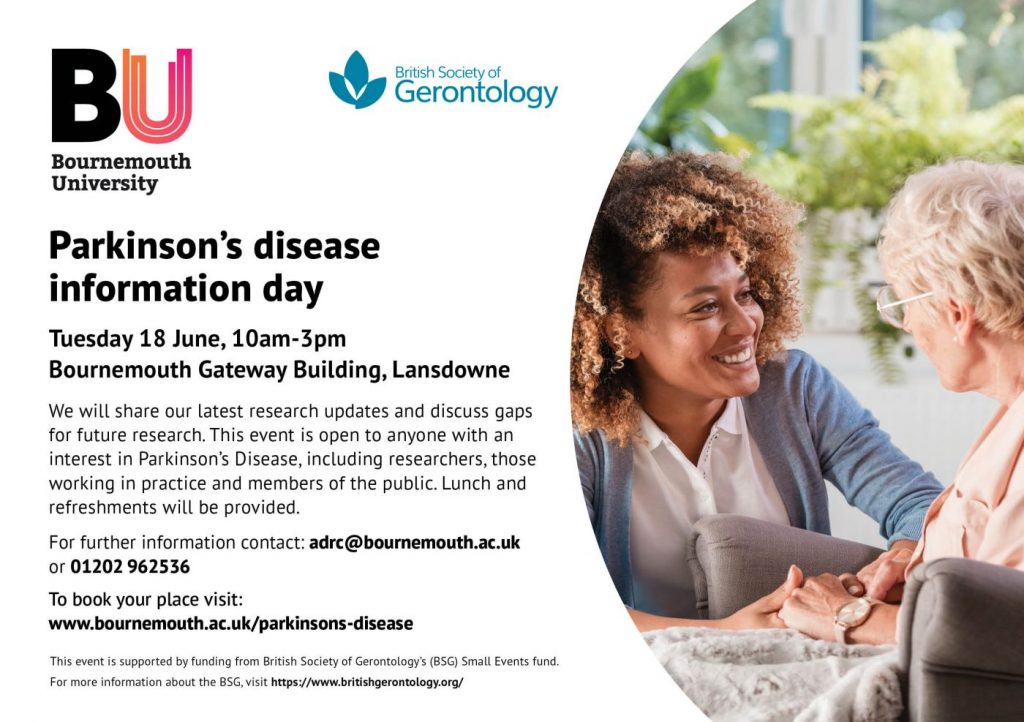
Needing Time & Space: The Innovation Common Room

NEED SOME TIME & SPACE TO CONTEMPLATE, INNOVATE & GENERATE?
THE INNOVATION COMMON ROOM
is at Fusion again TODAY – SAME TIME, SAME SPACE
A RELAXED PLACE FOR RESEARCHERS TO
MEET, DISCUSS & MENTOR
over tea, coffee and biscuits
Academics can invite their Post-Graduate Students
TODAY, 12.30 – 3.30, FG04
and EVERY WEDNESDAY afternoon throughout June
HELP ESTABLISH THIS REGULAR FEATURE AT FUSION BY JOINING
THE INNOVATION COMMON ROOM
Research Knowledge Exchange Culture: Making it Happen
Contact the BU Knowledge Exchange Manager, if you need to know more
wmorrison@bournemouth.ac.uk
World’s Largest Rock Art Documented by IMSET researchers
A new paper in the leading archaeological journal Antiquity led by Dr Phil Riris of the Institute for the Modelling of Socio-Environmental Transitions reports on likely candidates for the world’s largest individual rock engravings, located along the Orinoco River. In collaboration with partners at the UCL Institute of Archaeology and Universidad de Los Andes (Colombia), the paper provides important new insights into how the pre-Columbian world was shaped by the beliefs of its peoples. The paper is available in Open Access: https://doi.org/10.15184/aqy.2024.55
Unlike geoglyphs (large artistic markings excavated into the soil), petroglyphs are engraved directly on rock faces. Producing them requires a great deal of effort. The engravings reported in the paper are several tens of metres on a side, with the largest engraving of a snake having an estimated length of 40 metres or more, pointing to a significant investments of time and energy in their creation.
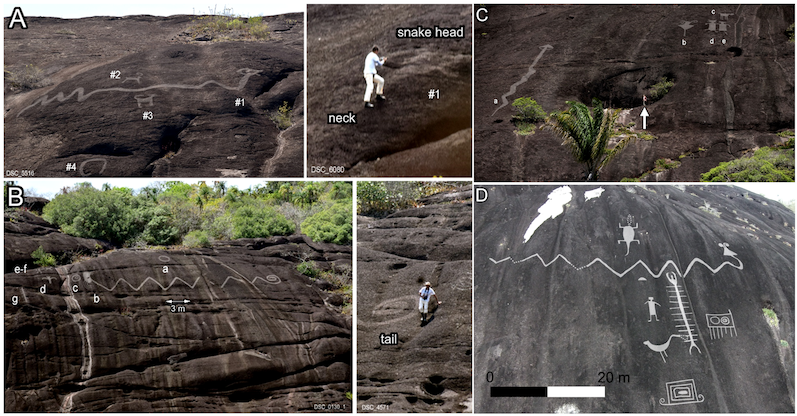
Some of the largest engravings of snakes reported in Colombia and Venezuela by the team. Images have been enhanced with a sketched overlay.
These “monumental” engravings include humans and animals resembling centipedes, deer, and birds, as well as large snakes such as boas or anacondas. They are typically located far up on hillsides overlooking stretches of the Orinoco river. They are thought to be related to marking territorial boundaries or appropriating new parts of the landscape during voyages, as they are regularly found along the river and its margins. Large “paintings” on hillsides are reported in the earliest missionary writings from the region, and may over time have become major landmarks in their own right.

Artistic impression of a giant snake swimming the Orinoco
It is vital that these monumental rock art sites are protected to ensure their preservation and continued study, with the Indigenous peoples of the Orinoco region central to this process.
The research was funded by the Leverhulme Trust, The Society of Antiquaries of London, Universidad de Los Andes, the Fundación de Investigaciones Arqueológicas Nacionales (Colombia), and the British Academy.
https://doi.org/10.15184/aqy.2024.55
Interdisciplinary Computational and Clinical Approaches at the Edge of Brain Research
We cordially invite you to the 3rd Symposium of the BU Interdisciplinary Neuroscience Research Centre on Wednesday, the 12th of June 2024, from 9:30-13:00 at the Inspire Lecture Theatre, Fusion Building (1st floor).
The symposium is entitled: “Interdisciplinary Computational and Clinical Approaches at the Edge of Brain Research”.
This third symposium revolves around contrasting computational and translational methodologies from a cross-disciplinary standpoint, leveraging synergies between BU and our collaborators in other universities and at the NHS. It is an opportunity for informal discussions on grant proposals and to explore shared interests with our external guests.
The schedule is as follows:
9:00-9:15. Welcome and Coffee.
9:30. Keynote talk: Prof. Dr Miguel Maravall (School of Life Sciences, Sussex Neuroscience Centre of Excellence, Sussex University): “What is the function of sensory cortex in a world full of actions? From sensory maps to task-directed responses”. The speaker will be on the screen.
10.20-10:40. Coffee and Discussions.
10:40-11:40. Session I. Integrating Cognitive and Computational Neuroscience.
- Michal Gnacek (Emteq Labs, Brighton and Centre for Digital Entertainment, BU): “Affect Recognition in Virtual Reality using Physiological Signals and Machine Learning”. The speaker will be on the screen.
- Dr Matteo Toscani (Department of Psychology, BU): “Unsupervised learning of haptic material properties”.
- Dr Géza Gergely Ambrus (Department of Psychology, BU): “Investigating Face Perception Using Cross-Experiment Multivariate Pattern Analysis of Neural Time-Series Data”.
11.40 -12.00. Coffee and Discussions.
12.00-13:00. Session II. Interdisciplinary Clinical Approaches and Closing Remarks.
- Prof. Dr Jonathan Cole (University Hospital Dorset, NHS): “Perception and action; Observations from congenital and acquired deafferentation”.
- Prof. Dr Caroline Edmonds (Department of Psychological Sciences, University of East London): ”Real-life implications arise from co-occurring memory impairments in children with neonatal hypoxic-ischaemic encephalopathy”.
- Prof Dr Birgit Gurr (Community Brain Injury and Adult Neuropsychology Services Dorset at Dorset HealthCare University, NHS) and Dr Ellen Seiss (Department of Psychology, BU). “An initial evaluation of the Dynamic Information Processing Programme”.
If you have any queries, please do not hesitate to contact Ellen Seiss, eseiss@bournemouth.ac.uk or Emili Balaguer-Ballester, eb-ballester@bournemouth.ac.uk. Feel free to forward this information to any colleague or student who may be interested.
Thank you very much, and we are looking forward to seeing you there.
Kind regards,
Ellen and Emili, on behalf of all of us.

THE INNOVATION COMMON ROOM: Going Old School
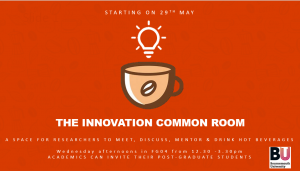
THE INNOVATION COMMON ROOM
is coming to Fusion
A SPACE FOR RESEARCHERS TO MEET, DISCUSS, MENTOR…
& DRINK HOT BEVERAGES
Academics can invite their Post-Graduate Students
29th MAY, 12.30 – 3.30, FG04
then EVERY WEDNESDAY afternoon throughout June
SAME TIME, SAME PLACE
On 29th May enjoy an inaugural light lunch buffet and sweet treats with your tea or coffee.
HELP ESTABLISH THIS REGULAR FEATURE AT FUSION BY JOINING:
THE INNOVATION COMMON ROOM
Research Knowledge Exchange Culture: Making it Happen
Contact the BU Knowledge Exchange Manager, if you need to know more
wmorrison@bournemouth.ac.uk
Successful Bid-generating Sandpit designed and facilitated by BU academics Catalin Brylla and Lyle Skains
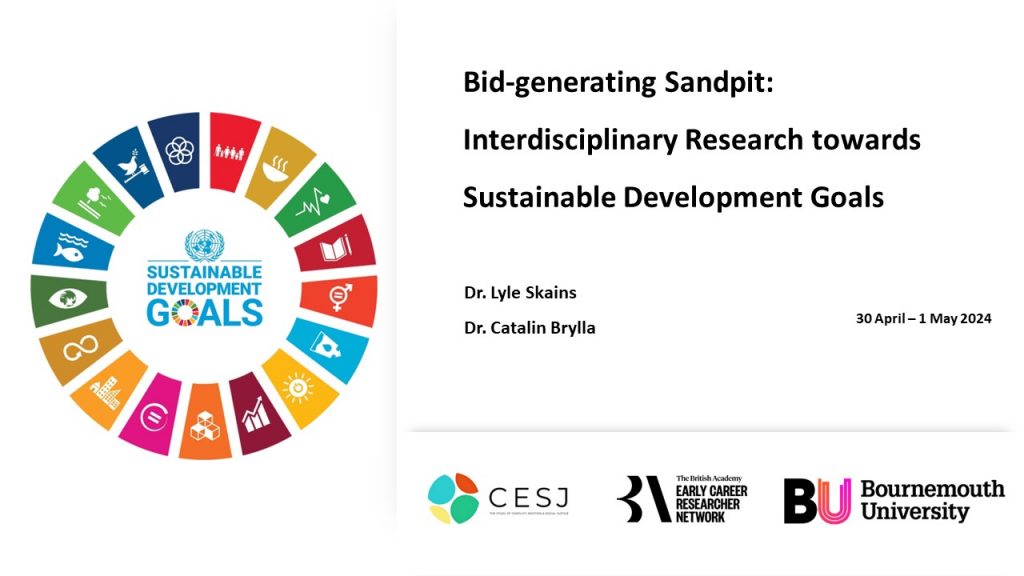 27 early career academics from ten universities came together 30 April-1 May in Bournemouth for a two-day sandpit funded by The British Academy Early Career Researcher Network and organised by Dr. Catalin Brylla (Centre for the Study of Conflict, Emotion, and Social Justice) and Dr. Lyle Skains (Centre for Science, Health, and Data Communication Research). The participants specialise in a variety of disciplines such as performance, media, business management, environmental sciences, anthropology, computing, architecture, law, engineering, tourism, and health studies. They brought their interests in a sustainable world and society (as represented by the UN Sustainable Development Goals) to the sandpit for networking, team-building, and funding and project development workshops, many of which were based on the successful and innovative NESTA-developed ‘Crucible’ programme (no longer online, but see the Welsh Crucible).
27 early career academics from ten universities came together 30 April-1 May in Bournemouth for a two-day sandpit funded by The British Academy Early Career Researcher Network and organised by Dr. Catalin Brylla (Centre for the Study of Conflict, Emotion, and Social Justice) and Dr. Lyle Skains (Centre for Science, Health, and Data Communication Research). The participants specialise in a variety of disciplines such as performance, media, business management, environmental sciences, anthropology, computing, architecture, law, engineering, tourism, and health studies. They brought their interests in a sustainable world and society (as represented by the UN Sustainable Development Goals) to the sandpit for networking, team-building, and funding and project development workshops, many of which were based on the successful and innovative NESTA-developed ‘Crucible’ programme (no longer online, but see the Welsh Crucible).
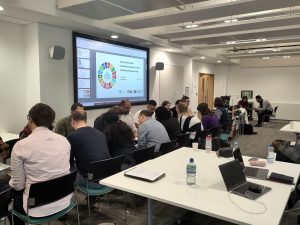 The success of the sandpit’s activities is highlighted by the culmination of six projects proposed to a panel of subject experts from Bournemouth University: Prof. Amanda Korstjens (ecology), Prof. Adele Ladkin (business), Prof. Huseyin Dogan (computing), Dr. Lyle Skains (arts practice and interdisciplinarity), Dr. Catalin Brylla (media practice) and Zarak Afzal (research development). These experts provide mentorship and feedback on the projects as they develop toward funding proposals. Two sandpit follow-up sessions will also aid the participants in developing their funding proposals.
The success of the sandpit’s activities is highlighted by the culmination of six projects proposed to a panel of subject experts from Bournemouth University: Prof. Amanda Korstjens (ecology), Prof. Adele Ladkin (business), Prof. Huseyin Dogan (computing), Dr. Lyle Skains (arts practice and interdisciplinarity), Dr. Catalin Brylla (media practice) and Zarak Afzal (research development). These experts provide mentorship and feedback on the projects as they develop toward funding proposals. Two sandpit follow-up sessions will also aid the participants in developing their funding proposals.
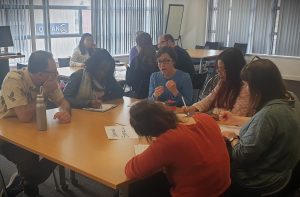 This is the first ‘crucible’ sandpit of its kind offered through the BA ECRN, though plans are under development for further offerings in both the Southwest and other regional hubs.
This is the first ‘crucible’ sandpit of its kind offered through the BA ECRN, though plans are under development for further offerings in both the Southwest and other regional hubs.
To receive news of further sandpits and development opportunities, join the BA ECRN.
SETS Research Seminar – Global Recycling Crisis – Wed 24th April
SETS research seminar: Wednesday 24th April at 3 pm on Zoom
The theme of this SETS cycle is the public problem of waste and the global sustainability crises related to the consumption and disposal of commodities.
In this seminar, Manisha Anantharaman will present her recent book Recycling Class. The Contradictions of Inclusion in Urban Sustainability (2024, MIT press).
Manisha is Assistant Professor of Sociology at the Center for the Sociology of Organisations, Sciences Po Paris (France). Manisha holds a PhD from the University of California Berkeley, and her research focuses on the politics of ecological transition and sustainability.
Zoom details to join:
https://unitn.zoom.us/j/85334570893
Meeting ID: 853 3457 0893
Passcode: SETS
SETS is a joint initiative between the Research Group on Collective Action, Change, and Transition at the University of Trento, the Centre for Sustainable and Socially Responsible Consumption at BU, and the Environmental Sociology Section at the University of Orebro. The seminars are open to a diverse audience, including academics, students, practitioners, social movements, and the non-specialist public.
Roberta Discetti, SETS co-founder
Interdisciplinary Computational and Clinical Approaches at the Edge of Brain Research
We cordially invite you to the 3rd Symposium of the BU Interdisciplinary Neuroscience Research Centre on Wednesday, the 12th of June 2024, from 9:30-13:00 at the Inspire Lecture Theatre, Fusion Building (1st floor).
The symposium is entitled: “Interdisciplinary Computational and Clinical Approaches at the Edge of Brain Research”.
This third symposium revolves around contrasting computational and translational methodologies from a cross-disciplinary standpoint, leveraging synergies between BU and our collaborators in other universities and at the NHS. It is an opportunity for informal discussions on grant proposals and to explore shared interests with our external guests. The general schedule is as follows:
9:15. Welcome and coffee.
9:30. Keynote talk: Prof. Miguel Maravall, Sussex University.
10.20-10:40. Coffee and grants discussion.
10:40-11:40. Session I. Integrating Cognitive and Computational Neuroscience.
11.40 -12.00. Coffee and grants discussion.
12.00-13:00. Session II. Interdisciplinary Clinical Approaches & Concluding Remarks.
If you have any queries, please do not hesitate to contact Ellen Seiss, eseiss@bournemouth.ac.uk or Emili Balaguer-Ballester, eb-ballester@bournemouth.ac.uk.
Thank you very much, and we are looking forward to seeing you there.
Kind regards,
Ellen and Emili, on behalf of all of us.

Dr Shanti Farrington presenting on dementia
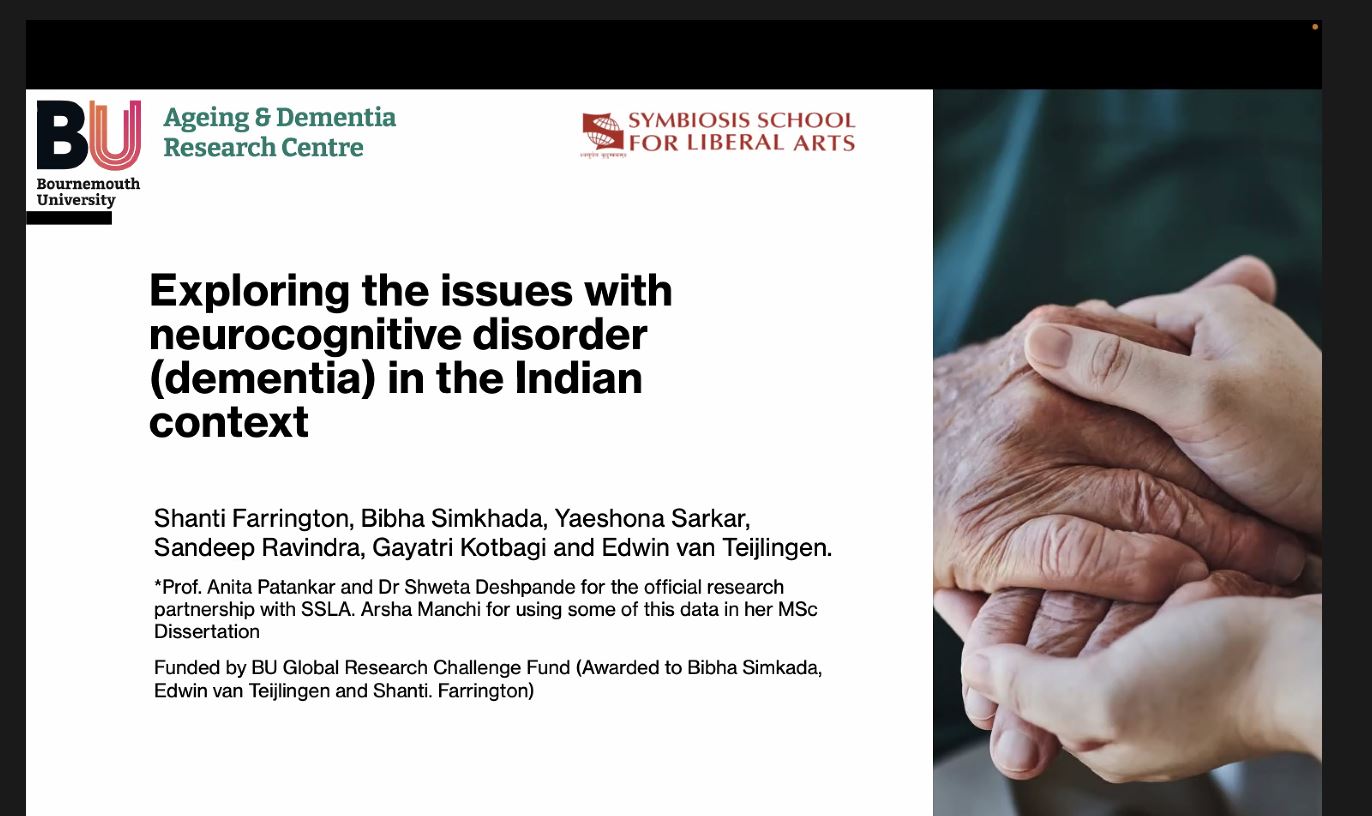 Today Dr. Shanti Farrington, Principal Academic in Psychology, presented our research work on dementia in India today. She was invited to speak to the ‘Research Participation Group of the Ageing & Dementia Research Centre (ADRC) at Bournemouth University. She addressed a range of interesting issues, for example she spoke about lack of training of health care workers in dealing with people living with dementia, but also in lack of experience in diagnosing different forms of dementia. She also spoke about the lack of experts neurologists in India, and the ageing population in this vast country.
Today Dr. Shanti Farrington, Principal Academic in Psychology, presented our research work on dementia in India today. She was invited to speak to the ‘Research Participation Group of the Ageing & Dementia Research Centre (ADRC) at Bournemouth University. She addressed a range of interesting issues, for example she spoke about lack of training of health care workers in dealing with people living with dementia, but also in lack of experience in diagnosing different forms of dementia. She also spoke about the lack of experts neurologists in India, and the ageing population in this vast country.
The discussion with the online audience also covered the role of diet in prevention of dementia and the limitations of using online health promotion material and general information on dementia in English, where some many languages are spoken. The underpinning research was largely funded by GCRF (Global Challenges Research Fund).
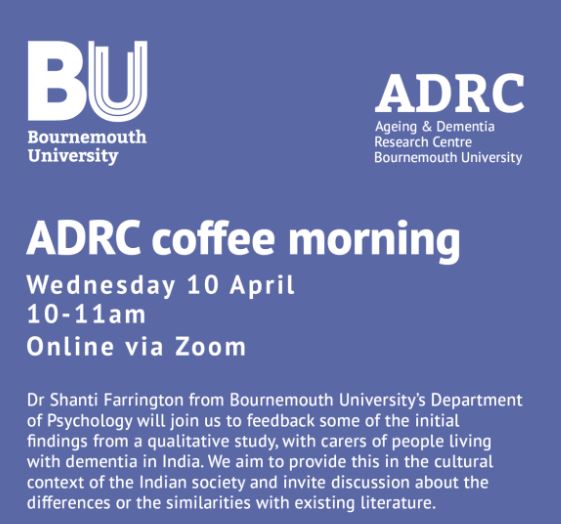
Prof. Edwin van Teijlingen
CMWH (Centre for Midwifery & Women’s Health)











 New weight change BU paper
New weight change BU paper One week to go! | The 16th Annual Postgraduate Research Conference
One week to go! | The 16th Annual Postgraduate Research Conference Geography and Environmental Studies academics – would you like to get more involved in preparing our next REF submission?
Geography and Environmental Studies academics – would you like to get more involved in preparing our next REF submission? Congratulations to three former BU staff
Congratulations to three former BU staff MSCA Staff Exchanges 2024 Call – internal deadline
MSCA Staff Exchanges 2024 Call – internal deadline Applications are now open for 2025 ESRC Postdoctoral Fellowships!
Applications are now open for 2025 ESRC Postdoctoral Fellowships! Horizon Europe – ERC CoG and MSCA SE webinars
Horizon Europe – ERC CoG and MSCA SE webinars MaGMap: Mass Grave Mapping
MaGMap: Mass Grave Mapping ERC grants – series of webinars
ERC grants – series of webinars